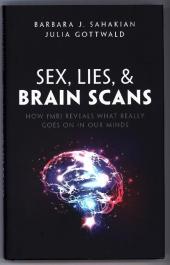 Neuerscheinungen 2017Stand: 2020-02-01 |
Schnellsuche
ISBN/Stichwort/Autor
|
Herderstraße 10
10625 Berlin
Tel.: 030 315 714 16
Fax 030 315 714 14
info@buchspektrum.de |

Julia Gottwald, Barbara J. Sahakian
(Beteiligte)
Sex, Lies, & Brain Scans
How fMRI reveals what really goes on in our minds, Winner of the British Psychological Society Book Award for Popular Science
2017. 176 S. 10 figures including a 4 page colour plate section. 222 mm
Verlag/Jahr: OXFORD UNIVERSITY PRESS 2017
ISBN: 0-19-875288-1 (0198752881)
Neue ISBN: 978-0-19-875288-2 (9780198752882)
Preis und Lieferzeit: Bitte klicken
The potential of fMRI is extraordinary. It allows us to observe brain activity in real time, build an understanding of thoughts and motivations, and discern unconscious biases. In a limited but real way we can now ´read minds´. Barbara Sahakian and Julia Gottwald explain the science, and consider the ethical implications of using these techniques.
The recent explosion of neuroscience techniques has been game-changing in terms of understanding the healthy brain, and in the development of neuropsychiatric treatments. One of the key techniques is functional magnetic resonance imaging (fMRI), which allows us to examine the human brain non-invasively, and observe brain activity in real time. Through fMRI, we are beginning to build a deeper understanding of our thoughts, motivations, and behaviours. Already fMRI has
been used to detect conscious activity in some patients who had all indications of being in a vegetative state, and even enabled us to communicate with some of them. This is just one of the many striking areas in which fMRI can be used to ´read minds´.
As neuroscientists unravel the brain networks of self-control and morality, we might find abnormalities in criminal offenders. Could we predict crimes before they are committed? fMRI has also been used to detect racial bias in some people who regarded themselves as fair-minded. Meanwhile, the reliability of fMRI as a lie detector in murder cases or as a tool for marketing is being debated.Sex, Lies, and Brain Scans takes readers beyond the media headlines. Barbara Sahakian and Julia Gottwald consider what the technique of fMRI entails, and what information it can give us, showing which applications are possible today, and which ones are science fiction. They also consider the important ethical questions these techniques raise. Should brain scans be allowed at airports to screen for terrorists? Should they be used to vet future judges and teachers? How far will we allow
neuroscience to go? It is time to make up our minds.
The authors highlight ethical issues that should be of interest to all of us. Psychology Today


